Filter by

3rd Annual Meeting of the Portuguese Association of Energy Economics & 5th Me…
Message from the Programme Committee Chair The 3rd Annual Conference of the Portuguese Association of Energy Economics – APEEN and the International Meeting on Energy and Environmental Economics – ME3 took place on the 18-19 October 2018 in Braga, Portugal. The event was hosted by the Universidade do Minho and gathered the contributions of specialists in Energy and Environmental Economics t…
- Edition
- -
- ISBN/ISSN
- -
- Collation
- -
- Series Title
- -
- Call Number
- -

Self-Governance and Sami Communities : Transitions in Early Modern Natural Re…
- Edition
- -
- ISBN/ISSN
- 978-3-030-87498-8
- Collation
- -
- Series Title
- -
- Call Number
- -
- Edition
- -
- ISBN/ISSN
- 978-3-030-87498-8
- Collation
- -
- Series Title
- -
- Call Number
- -
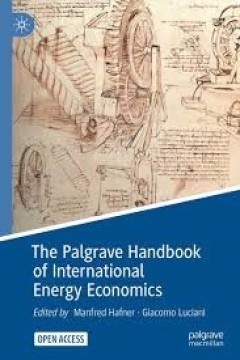
The Palgrave Handbook of International Energy Economics
- Edition
- -
- ISBN/ISSN
- 978-3-030-86884-0
- Collation
- -
- Series Title
- -
- Call Number
- -
- Edition
- -
- ISBN/ISSN
- 978-3-030-86884-0
- Collation
- -
- Series Title
- -
- Call Number
- -
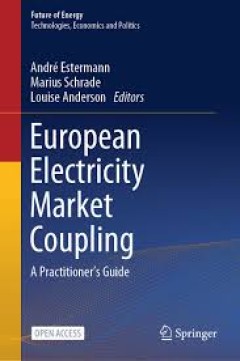
European Electricity Market Coupling: A Practitioner’s Guide
This open access book provides a comprehensive overview of the European Electricity Market Coupling. Tracing the evolution of the EU’s efforts to create an Internal Energy Market, it explores the history, principles and roles of all key actors from Transmission System Operators (TSOs) to service providers to National Regulatory Authorities (NRAs) in Single Day-ahead and Intraday Coupling. Ke…
- Edition
- 1
- ISBN/ISSN
- 978-3-031-86315-8
- Collation
- XI, 368
- Series Title
- -
- Call Number
- -
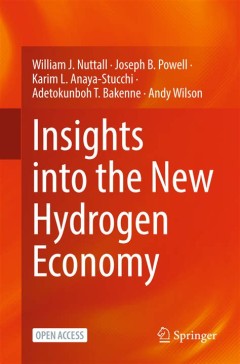
Insights into the New Hydrogen Economy
This open access book offers a comprehensive exploration of the future of the hydrogen industry. It builds upon insights gathered from a series of expert workshops and follow-on activity. International experts from various fields, including industry, public policy, and academia, engaged in dialogue and knowledge exchange, resulting in invaluable findings and observations. This book builds upon…
- Edition
- 1
- ISBN/ISSN
- 9783031718335
- Collation
- XXIX, 162 hlm; ill., lamp.,
- Series Title
- -
- Call Number
- -

The Palgrave Handbook of International Energy Economics
This open access handbook is distinguished by its emphasis on international energy, rather than domestic energy policies or international geopolitic aspects. Addressing key topics such as energy production and distribution, renewables and corporate energy structures, alongside global energy trends, regional case studies and emerging areas such as the digitalization of energy and energy transiti…
- Edition
- 1
- ISBN/ISSN
- 978-3-030-86884-0
- Collation
- -
- Series Title
- -
- Call Number
- LXVI, 770

Electricity Access, Decarbonization, and Integration of Renewables: Insights …
This Open-Access-Book covers different aspects of the low-carbon energy transformation in a unique manner, with a particular focus on two regions, South Asia and Sub-Saharan Africa. The first part of the book provides useful insights on changes and reforms in the energy sector of Bangladesh, while the second part illustrates the low-carbon energy transformation in South Asia and the third part …
- Edition
- 1
- ISBN/ISSN
- 978-3-658-38215-5
- Collation
- -
- Series Title
- Energiepolitik und Klimaschutz. Energy Policy and Climate Protection
- Call Number
- XII, 280

Vulnerable Households in the Energy Transition
This open access book explores the energy transition / energy poverty nexus in the European Union, including the implications of the transition and related policies for the household sector. Written by experts on energy economics, energy studies and related fields, it examines the impacts and costs of the energy transition (including those caused by carbon pricing) for the economy and for famil…
- Edition
- -
- ISBN/ISSN
- 978-3-031-35683-4
- Collation
- -
- Series Title
- -
- Call Number
- -
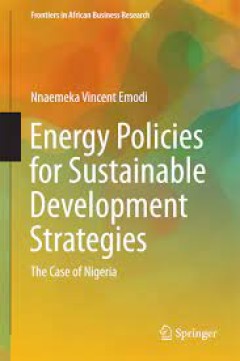
Energy Policies for Sustainable Development Strategies the Case of Nigeria
In this book, a number of long-term energy scenarios are developed for Nigeria considering the impact of vital factors that may influence energy policies in the country’s future energy system. The energy scenarios were developed through the Long-Range Energy Alternatives Planning System (LEAP) model. The model identified the future energy demand and supply pattern using a least-cost combinati…
- Edition
- 1
- ISBN/ISSN
- 978-981-10-0974-7
- Collation
- 85 b/w illustrations
- Series Title
- -
- Call Number
- -
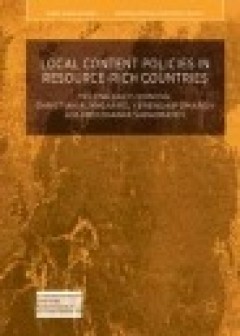
Local Content Policies in Resource-rich Countries
This book analyses the role of local content (LC) policy in the economic development of five resource-rich countries: Brazil, Kazakhstan, Norway, Russia and the UK. The authors situate LC policy within a framework of sustainability in the form of industrial diversification and innovation-led growth, and examine how effective LC policies are in facilitating sectoral and economy-wide catching up.…
- Edition
- -
- ISBN/ISSN
- 978-1-137-44786-9
- Collation
- -
- Series Title
- -
- Call Number
- -
 Computer Science, Information & General Works
Computer Science, Information & General Works  Philosophy & Psychology
Philosophy & Psychology  Religion
Religion  Social Sciences
Social Sciences  Language
Language  Pure Science
Pure Science  Applied Sciences
Applied Sciences  Art & Recreation
Art & Recreation  Literature
Literature  History & Geography
History & Geography